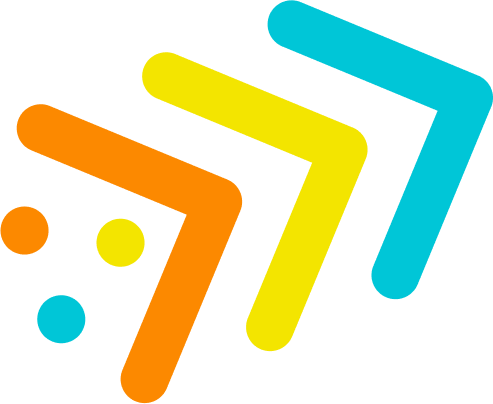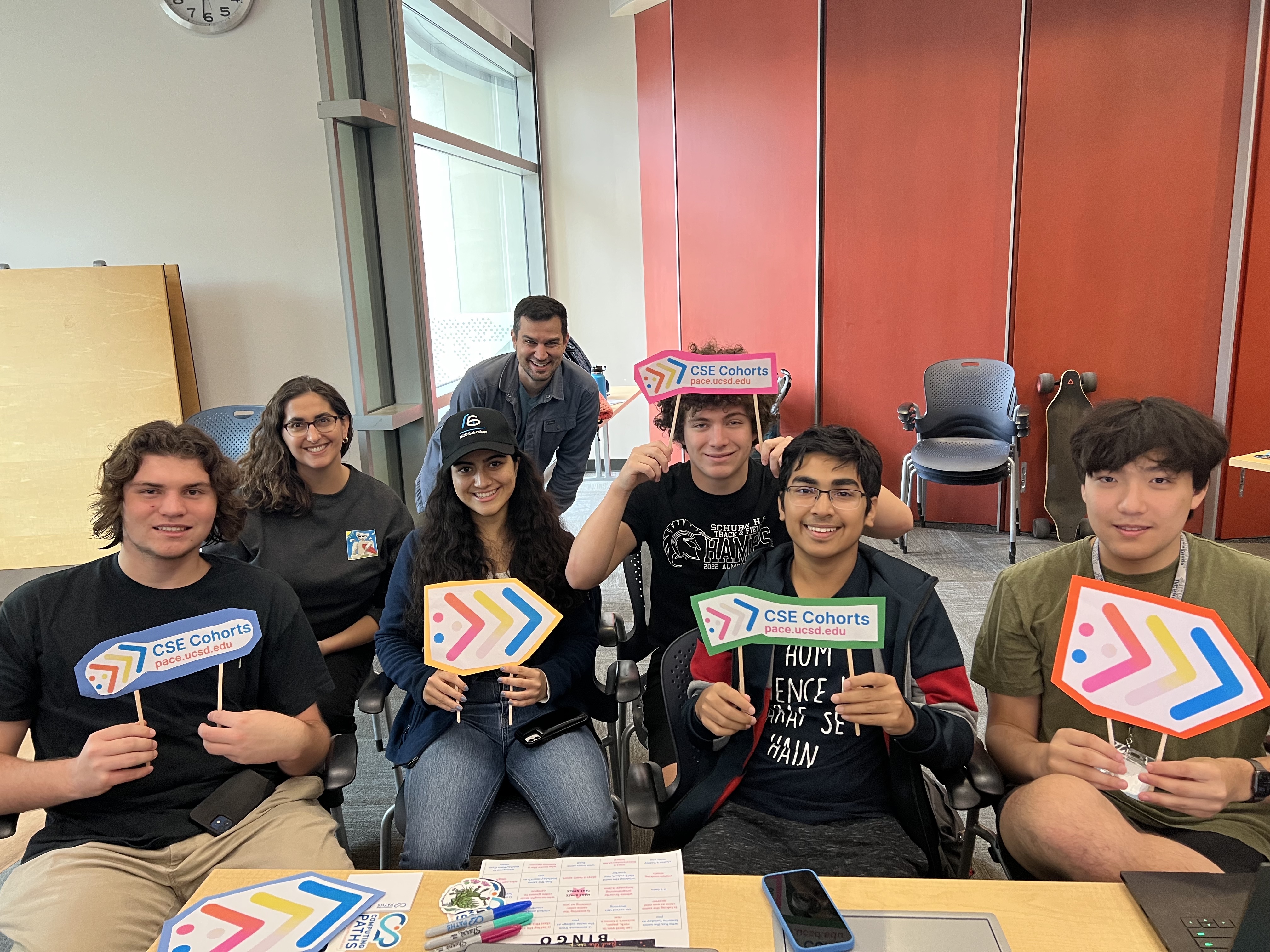 CSE-PACE Cohorts
CSE-PACE Cohorts

First-year CSE students are organized into cohorts each led by an experienced CSE undergraduate mentor. Cohorts meet weekly to talk about CSE courses and the impacts of cutting-edge computing topics over free food. CSE-PACE is free to students, designed for all first-year computing students, and runs for the entire academic year.
- Contact us at pace@ucsd.edu. Support CSE-PACE: Give now.
"PACE has been such a benefit towards my mental health. Being able to relax, meet new people, and talk about topics that are interesting brings joy to my day."
"Being a commuter as a first year it is really hard to connect with people in a different level then talking to people during lectures so being in PACE was a very memorable and important part of my first year at UCSD as I was able to socialize and form friendships with other people in PACE and found a little community that I will remember forever."
"I still remember how the PACE leadership asked us to share our difficulties in CSE courses during the PACE cohort meeting. My worst experiences as a transfer student were shared with them, and they always encouraged me and offered some personal advice to help me succeed."
"I found the discussions in AI within music and working with the arduino robots to be very memorable. I also really enjoyed speaking with the PACE LPMs as they provided very good advice and information about getting more involved within CSE at UCSD."
100+ student participants
10 : 1 student-mentor ratio
Ready-to-use cohort activities
Coordinate with campus admissions + orientation leaders + student organizations + instructors of first-year classes.
Schedule as credit-bearing class for visibility when students register.
Multiple entry points to join and individualized checkins for participants.
Routinely analyze cohorts and coordinate with student advisors to broaden invitation pool.
Approx. $10 / student/ week cohort lunches
Approx. $3000 / lead peer mentor stipend per year
[[Per cohort: approximately $10000 a year]]
1 TA + 4 faculty teaching credits for leadership team
Advising and recruiting team
Resources and Publications
- Core principles and program design
- "Make space, Take space" is the motto for CSE-PACE. Here is a document about how we introduce, operationalize, and apply this document. [Link to overview]
- Weekly session launch slides [Link to Lesson Plan][Link to Launch Slides]
- Sample term overview schedule are some example schedules that can be used to help plan a term or semester of this course.
- Sample term overview plans and resources is an example of a detailed document that we use to keep track of all the external (food vendors, recruitment, etc) and internal plans (lesson plans) that are needed week to week for a term/semester.
- Professional development for team [Link]
- Recruiting Lead Peer Mentors [Link]
- Orientation and onboarding [Link]
- Weekly Lead Peer Mentor meeting [Link]
- To Block or Not to Block
- This lesson introduces students to block-based programming. Students will critically think on the benefits of using block-based programming to teach computing concepts, as well as which people benefit from this methodology, compared with traditional programming. [Link to Lesson Plan for Week 1] [Link to Lesson Plan for Week 2] [Link to Slides]
- The Power of Bugs
- This lesson introduces students to ways in which technology is being used in agriculture and the environment. Students will assess the potential that exists for combining computing work with agriculture. [Link to Lesson Plan] [Link to Slides]
- Computing as a Teammate in Healthcare
- This lesson introduces students to ways in which technology is being used in healthcare. Students will consider how computing can be used as an aid for health officials, rather than a replacement, in order to improve patient care. [Link to Lesson Plan]
- Impacts in Lithium Mining
- This lesson exposes students to the harmful effects that the rise of technology has had, particularly on local communities and the environment, and consider small actions that can be taken towards these issues. [Link to Lesson Plan] [For the slide deck, refer to the second half of the slide deck linked for "The Power of Bugs"]
- Bias in Generative Artificial Intelligence
- Two-day session introducing students to AI starting with hands-on exploration of DALL-E (2022 popular image generation) tool, introducing to major concepts in machine learning, and exposing students to problems of potential bias in public data sets. [Link to lesson plan] [Link to Slides]
- An Intro to Generative AI
- Motivated by the Rise of ChatGPT and other Generative Technologies, this lesson introducces major concepts in the basics of Machine Learning and Prompt Engineering, and exposed students to consider the ethical implications of using Generative Technologies. [Link to Lesson Plan] [Link to Slides]
- Machine Bias
- Introducing the concept of the "coded gaze", This is a 2-Day Lesson that focuses on training about data and how that can lead to implicit bias in model performance. [ Link to Week 1 Lesson Plan ] [ Link to Week 2 Lesson Plan ] [Link to Slides]
- Machine Learning Risks - Criminal Sentencing
- Introduces the potential risk of using predictive policing and other risk assessment algorithms. Students will learn to analyze features that models could use to precieve recidivism, and draft ways to mitigate bias in AI systems. [Link to Lesson Plan]
- Teaching Computers to Improve Musically
- Students will learn how to distinguish between AI Generated Music and real-life songs, and will be exposed to generative technologies. Students will then be able to assess what other parameters/features are needed to adequately train the AI to generate more "familiar" music for students. [Link to Lesson Plan] [Link for Motivation]
- Password Safety
- Reinforce the importance of password security and using a variety of different tools to support creating new passwords and storing them securely. Students will be exposed to password managers and will have the ability to check whether their password is secure or not. [Link to Lesson Plan] [Improving Security Lesson Plan] [Link to Slides]
- Bluetooth Tracking
- Continuing from the Password Safety Lesson, students will be exposed to research that focuses on gathering telemtry/information from Bluetooth data and how signals are decoded to gather information about a user. Students will then open up various social media platforms to see how much information large data-centers and algorithms have on them. [Link to Lesson Plan][Link to Slides]
- Environmental Impact of Computing
- Explore the industrial need for lithium-ion batteries and reflect on their environmental impacts. Students will learn about different views from environmentalists and industrialists on lithium-ion batteries and develop their own views. [Link to Lesson Plan]
- Crypto, Bitcoin, & Blockchain
- Two-day session introducing students to the idea behind crypto and the importance of blockchain. Students will also learn about the security issues and ethical implications of blockchain. [Link to Lesson Plan] [Link to Cryptoming Capacity Lesson Plan] [Link to Slides]
- VSCode Extensions
- Introduce some useful VSCode extensions that might be helpful for students when programming. Students will explore multiple extensions and tricks that help them become more productive when using VSCode. [Link to Lesson Plan] [Link to Slides]
- Lily Bots
- Introduce the basic ideas behind Lily Bot control and let students build their own robots in two sessions. Students will work in groups, assemble the robot, and program it so it can perform desired actions. [Link to Lesson Plan] [Link to Slides]
- Office Hours and Networking
- Two Day Session learning how to navigate attending office hours by asking students to design questions to ask professors. Students will be able to practice these skills by attending professor office hours as a cohort. [Link to Lesson Plan] [Link to Slides]
- Imposter phenomenon
- TBA
- Course planning
- One-day session to help students understand their university, college, and major requirements, create a 4-year plan, and explore various course planning resources. [Link to lesson plan] [Link to slides]
- SIGCSE TS 2024
- "Welcoming Students to Undergraduate Computer Science Programs: On-ramps, Rest Areas, and Lane Changes" Niharika Bhaskar, Amari N. Lewis, Rona Darabi, Joana Fang, Jingting Liu, Kristen Vaccaro, Joe Gibbs Politz, Mia Minnes Digital Library entry (open-access, including video presentation).
- NSF Project Showcase Slides.
- RESPECT 2023
- "Comparing Student Social Networks and Academic Experiences in Computing and Biology Courses" Amari N. Lewis, Kristin Tenney, Kristen Vaccaro, Joe Gibbs Politz, Mia Minnes. 2023 Conference on Research in Equitable and Sustained Participation in Engineering, Computing, and Technology (RESPECT) Slides.
- ASEE 2023
- "Taking the Next Course: Facilitators and Barriers Reported by Computer Science Majors" Amari N. Lewis, Joe Gibbs Politz, Kristen Vaccaro, Mia Minnes. ASEE '23 permalink, https://drive.google.com/file/d/1C0bJVvTNRr8Zxr9lgzB2LA_oepkEdJme/, Slides.
- Seminar at Uppsala Universitet 2023
- "Taking The Next Steps Towards The Humanization of Computing & Engineering Education" Invited talk at: Uppsala Universitet June 8, 2023. Slides
- Illinois Computer Science Summer Teaching Workshop 2023
- "Lost in the crowd, rising above it, or somewhere in the middle?" Invited talk at: Illinois Computer Science Summer Teaching Workshop, June 5-6, 2023. Slides
- ITISCE 2022
- "Learning about the Experiences of Chicano/Latino Students in a Large Undergraduate CS Program" Amari N. Lewis, Joe Gibbs Politz, Kristen Vaccaro, Mia Minnes. ITISCE '22 https://dl.acm.org/doi/abs/10.1145/3502718.3524780
-
"Making Visible and Modeling the Underrepresented: Teachers' Reflections on Their Role Modeling in Higher Education"
Virginia Grande, Päivi Kinnunen, Anne-Kathrin Peters, Matthew Barr, Åsa Cajander, Mats Daniels,
Amari N. Lewis , Mihaela Sabin, Matilde Sánchez-Peña, Neena Thota. ITISCE '22. https://dl.acm.org/doi/abs/10.1145/3502717.3532170 (abstract), https://doi.org/10.1145/3571785.3574122
Leadership Team
- Founding Faculty
- Dr. Amari N. Lewis
- Dr. Mia Minnes
- Dr. Joe Politz
- Dr. Kristen Vaccaro
- Advisory Board
- Dr. Christine Alvarado, UC San Diego
- Dr. Kathi Fisler, Brown University
- Dr. Philip Guo, UC San Diego
- Patrick Mallon, UC San Diego (2021-2022)
- Dr. Heather Pon-Barry, Mount Holyoke College
- Dr. Fiona McNeill, University of Edinburgh
- Funding and Collaborations
- UC San Diego Computer Science and Engineering Department
- UC San Diego CSE DEI Committee
- UC San Diego Council of Provosts
- National Science Foundation, Grant CNS-2137928 (2021-2023)
- Student Leadership
- Nitya Agarwal (Lead Peer Mentor, 2022-2023)
- Gonzalo Allen-Perez (Lead Peer Mentor, 2024-2025)
- Brendan Barber (Lead Peer Mentor, 2025-2026)
- Ryan Batubara (Lead Peer Mentor, 2023-2025)
- Niha Bhaskar (TA, 2022-2023)
- Katherine Charry (Lead Peer Mentor, 2025-2026)
- Kathy Chen (Lead Peer Mentor, 2023-2024)
- Mia Chen (Lead Peer Mentor, 2024-2026)
- Anya Chernova (Lead Peer Mentor, 2024-2026)
- Charisse Chua (Lead Peer Mentor, 2023-2025)
- Laurence D'Ercole (Lead Peer Mentor, 2022-2023)
- Gowtham Duggirala (Lead Peer Mentor, 2024-2025)
- Emily Ekaireb (Lead Peer Mentor, 2022-2023; TA 2023-2024)
- Ali El Lahib (Lead Peer Mentor, 2025-2026)
- Sonia Fereidooni (Lead Peer Mentor, 2024-2025)
- Yuan Gao (Lead Peer Mentor, 2022-2025)
- Galen Han (Lead Peer Mentor, 2022-2023)
- Karisma Kumar (Lead Peer Mentor, 2023-2024)
- Peter Lee (Lead Peer Mentor, 2023-2025)
- Nikitha Maderamitla (Lead Peer Mentor, 2024-2026)
- D'ante McCurty (Lead Peer Mentor, 2023-2026)
- Bryan Min (Lead Peer Mentor, 2022-2023)
- Audria Montalvo Saravia (Lead Peer Mentor, 2022-2024)
- Andrew Oabel (Lead Peer Mentor, 2022-2024; TA 2024-2025)
- Sathwika Peechara (Lead Peer Mentor, 2025-2026)
- Yuval Pesok (Lead Peer Mentor, 2025-2026)
- Samantha Prestrelski (Lead Peer Mentor, 2023-2025)
- Sachin Ramanathan (Lead Peer Mentor, 2025-2026)
- Ryan Rickey (Lead Peer Mentor, 2023-2024)
- Jose Salazar (Lead Peer Mentor, 2023-2024)
- Pratham Savla (Lead Peer Mentor, 2024-2025)
- Ginger Smith (Lead Peer Mentor, 2022-2023)
- Samvrit Srinath (Lead Peer Mentor, 2023-2025)
- Chase Stabler (Lead Peer Mentor, 2022-2023)
- Joshua Villanueva (Lead Peer Mentor, 2023-2026)
- Alessia Welch (Lead Peer Mentor, 2022-2024)
- Ray Zou (TA 2025-2026)
- Curriculum Development and Research
- Yutong Chen
- Rona Darabi
- Joana Fang
- Mingyang (Chimingyang) Huang
- Jeannie Kim
- Jingting Liu
- Iman Malhi
- Bryan Min
- Malcolm (Jooahn) Park
- Winnie She
- Zelong (Alan) Wang
- Jackson (Zhicheng) Wang
- Hinn Zhang